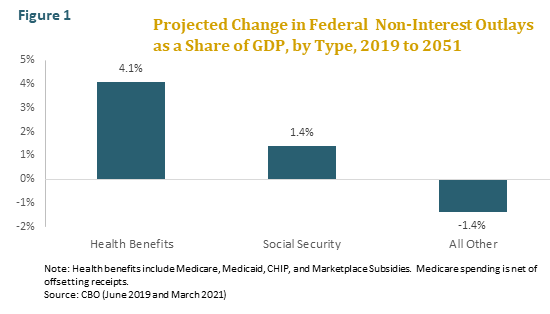A New Paper by the Concord Coalition and Global Aging Institute
FOR IMMEDIATE RELEASE: Monday, February 28, 2022
CONTACT: Av Harris 202-695-9524 [email protected]
Washington, DC – The Concord Coalition and the Global Aging Institute (GAI) today jointly released a new paper entitled, “Three Myths About Health-Care Reform.” The paper, which is part of a quarterly issue brief series called The Shape of Things to Come, explains why controlling the rising cost of Medicare, Medicaid and other federal health benefit programs is critical to the nation’s fiscal future and dispels three powerful myths that continue to get in the way of effective cost control.
“The growing cost of health benefit programs, along with interest on the national debt, is the main driver of long-term budget deficits,” said Robert L. Bixby, executive director of The Concord Coalition. “At some point, policymakers will have no choice but to confront the long-term deficit challenge, which means that they will have no choice but to confront the challenge of rising health benefit spending. With surging inflation threatening to increase interest rates, and hence federal borrowing costs, now is a good time to correct some of the wishful thinking and mistaken assumptions that have undermined past efforts to control the cost of federal health benefits.”

The paper focuses on three myths. “Each of these myths has its roots in a valid observation,” said Richard Jackson, President of the Global Aging Institute and author of the paper. “The conclusions drawn from these observations, however, are deeply flawed.”
- Myth 1: Spending can be painlessly controlled simply by eliminating waste and improving the efficiency of the health-care system. Reality: The U.S. health-care system is indeed filled with waste and inefficiency. But pure waste is more difficult to identify in practice than in theory—and even if we could identify and eliminate all of it, it would constitute a one-time savings that does little to alter the long-term growth in health-care spending, which is being driven by the aging of the population, advances in medical technology, and rising public expectations about care and cure. Real cost control will inevitably require real trade-offs.
- Myth 2: The experience of other developed countries with national health systems proves that it is possible for the United States to achieve better health outcomes at lower cost without imposing any sacrifice on beneficiaries. Reality: It is true that countries with national health systems spend much less than we do, while at the same time performing better on basic measures of health like life expectancy at birth. But the main reason they achieve better health outcomes is that they have lower rates of chronic morbidity, especially lifestyle-related morbidity due to obesity and substance abuse. And the main reason they spend less is that they set limits—or, in other words, ration care. With or without a national health system, there is no way for the United States to avoid difficult choices.
- Myth 3: Efficient and fair federal cost control is not feasible unless we first enact comprehensive national health-care reform. Reality: A comprehensive public-private solution may well make it easier for the federal government to control costs. Then again, to judge by Congress’ failure over many decades to control the cost of our existing health benefit programs, it may make it harder. In any case, the federal government’s vast health-care market clout and extensive tax and regulatory powers give it ample tools to control health benefit spending while ensuring the quality and availability of care for beneficiaries. There is no need to wait for comprehensive reform to begin. Indeed, we must not wait since the deficit-financed growth in health benefit spending threatens the nation’s future.
“In the end,” said Jackson, “America will have no choice but to restrain the growth in federal health benefit spending. The place to start is for the federal government to create a global budget with annual targets for what it spends on health care, just as governments in many other developed countries do. This budget could be enforced through top-down controls on the price and volume of services. Or it could be enforced through a wholesale restructuring of our health-care system’s cost-plus incentives. Here the surest approach would be to capitate Medicare and Medicaid—that is, to replace today’s open-ended payment promises with a system of ‘premium support’ consisting of fixed-dollar subsidies that beneficiaries would use to purchase insurance.”
“We cannot avoid potentially painful trade-offs,” added Bixby. “Our leaders must stop pretending they can finesse them. The longer we wait to act the more difficult the choices will become.”
Click here for the whole paper, “Three Myths About Health-Care Reform.” Other papers in the series can be found by clicking here. Tune in to Concord’s upcoming podcast episode on Facing the Future (broadcast March 2, 2022) to hear Jackson and Bixby discuss the paper.
The Concord Coalition is a nonpartisan, grassroots organization dedicated to fiscal responsibility. Since 1992, Concord has worked to educate the public about the causes and consequences of the federal deficit and debt, and to develop realistic solutions for sustainable budgets. For more fiscal news and analysis, visit concordcoalition.org and follow us on Facebook @ConcordCoalition and on Twitter: @ConcordC




